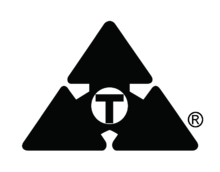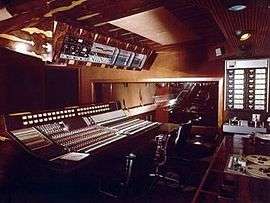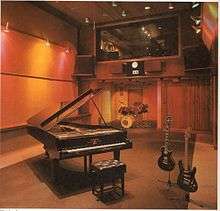Trident Studios


Trident Studios was a British recording facility, located at 17 St. Anne's Court in London's Soho district between 1968 and 1981. It was constructed in 1967 by Norman Sheffield, a drummer of former 1960s group the Hunters, and his brother Barry. The current residing business, Trident Sound Studios Ltd, which opened in 1993, although not related, was named in recognition of the original Trident Studios
"My Name is Jack" by Manfred Mann was recorded at Trident in March 1968, and helped launch the studio's reputation. Some well-known albums and singles recorded at Trident include the Beatles' White Album (although recording was largely done at Abbey Road Studios) and "Hey Jude", George Harrison's triple album All Things Must Pass, Elton John's "Candle in the Wind" and David Bowie's The Rise and Fall of Ziggy Stardust. Rick Wakeman was the in-house session keyboard player at the time and can be heard on many recordings, including Bowie's songs "Life on Mars?" and "Changes".
Other artists recorded at Trident included the Bee Gees, Carly Simon, Chris de Burgh, Genesis, Brand X, James Taylor, Joan Armatrading, Joe Cocker, Kiss, Lou Reed, Peter Gabriel, Marc Almond, Marc and the Mambas, Soft Cell, Queen, the Rolling Stones, Thin Lizzy, Tina Turner, T-Rex, Van der Graaf Generator, Yes and John Entwistle.
The Sheffield brothers had a relaxed working attitude, but also emphasised high standards of audio engineering.[1] The studio's state-of-the-art recording equipment helped attract many major artists to record there.
The Beatles and Apple Records
In mid-1968, Trident Studios were among the first in the UK to use Dolby noise reduction, and employ an eight-track reel to reel recording deck.
While Abbey Road Studios still only used four-track at the time, Trident's Ampex eight-track machine drew the Beatles on 31 July 1968 to record their single "Hey Jude". Paul McCartney later said about recording the track at Trident: "Words cannot describe the pleasure of listening back to the final mix of 'Hey Jude' on four giant Tannoy speakers which dwarfed everything else in the room ..."[1] The White Album tracks "Dear Prudence", "Honey Pie", "Savoy Truffle" and "Martha My Dear" were also recorded there, and on 22 February 1969, the Beatles first recorded "I Want You (She's So Heavy)" for the album Abbey Road. John Lennon and Yoko Ono later returned with the Plastic Ono Band to record "Cold Turkey" featuring Eric Clapton on lead guitar.
Many Apple Records artists used Trident Studios, including Badfinger, Billy Preston, Mary Hopkin, and James Taylor. Part of George Harrison's triple album All Things Must Pass, containing the hit "My Sweet Lord", and Ringo Starr's "It Don't Come Easy", were also recorded there. Harry Nilsson recorded "Without You" at Trident, and portions of several of his 1970s albums.
Queen
The history of the Sheffield brothers and Trident Studios is also linked to the early discovery and success of the band Queen. In 1972, Trident Studios started two record production companies, one of which (Neptune Productions) initially signed three artists, Mark Ashton, Eugene Wallace and Queen. The agreements with the artists were for recording and publishing, but Queen had no management, so they insisted that Trident also take on that responsibility. Trident initially reluctant, eventually agreed and Queen signed an agreement with Trident Recording, Publishing and Management, on 1 November 1972.
The Management at the time claimed the deal allowed the band full access to the studio's cutting edge facilities, and supported them by providing the best producers and engineers - so long as the foundations of the band's first album Queen were recorded 'off peak'.[1]
After the album was completed the Sheffield brothers had great difficulty finding a record company to take on the album and release it.[1] Finally, eight months later, the brothers decided to take on the risk and fund the release themselves and Queen released their self-titled first album under the Trident label in a license deal with EMI in the UK and Elektra in the US. Trident subsequently released Queen II, Sheer Heart Attack and A Night at the Opera under this same arrangement. After the band left Trident, they signed directly to EMI and Elektra.
David Bowie, Elton John and others
In March 1968, Manfred Mann recorded Trident's first number one at the studio, the single "My Name is Jack". From 1968-1981, some of the most reputed artists used the studios for their recordings, including David Bowie, Elton John, Marc Bolan/T.Rex, Carly Simon, Frank Zappa, The Rolling Stones, Free, Genesis, Lou Reed, Joan Armatrading, Black Sabbath, Lindisfarne, Dusty Springfield, The Mahavishnu Orchestra, Krisma, Jeff Beck/Rod Stewart and other artists. Elton John's "Your Song" and Carly Simon's "You're So Vain" were both engineered at Trident by Robin Geoffrey Cable, who later went on to produce two albums for The Dickies.
This period coincided with the incorporation of a young engineer called Ken Scott, who Trident hired and went on to become one of the most reputed engineers and producers in the history of rock music, with his involvement in David Bowie's albums Hunky Dory (1971) and The Rise and Fall of Ziggy Stardust (1972). Scott later gained an international reputation with numerous works, including Supertramp's Crime of the Century (1974), Lou Reed's Transformer (1972), Dixie Dregs' What If (1978), Devo's Duty Now for the Future (1980) and Jeff Beck's There and Back (1980).
Tony Stratton-Smith's Charisma Records was also one of the most regular clients of the studios during the 1970s. Genesis recorded at Trident several of their most renowned albums there, including Trespass (1970), Nursery Cryme (1971) and A Trick of the Tail (1976). The Jazz Fusion Band Brand X recorded their debut studio album Unorthodox Behaviour here (1976). Other artists from the label who recorded at Trident were Van der Graaf Generator, Peter Hammill, Lindisfarne and Peter Gabriel. Charisma's first Van der Graaf Generator release, The Least We Can Do Is Wave to Each Other, was recorded at Trident from 11 to 14 December 1969. Most of the album was recorded on 8 tracks, but the last song, "After the Flood", was recorded on 16. Trident was yet again among the first studios in the UK to obtain a 16-track machine.[1]
The Trident 'A' Range console

The Trident A Range consoles were originally built by and for Trident Studios. Other studios placed their orders and Trident Audio Developments was formed. Cherokee Studios in Los Angeles was one of the early recipients of one of the first production models, and ultimately purchased three new from Trident and one from a broker at a later time.[1] David Bowie, Rod Stewart, and Frank Sinatra are among the early artists who first recorded hit records on Cherokee’s first 'A' Range console.
"Though it had a very limited run, the Trident A Range console gained a reputation for its very distinct and pleasant sound with a very "musical" EQ section. Along with channel strips from early Neve and Helios consoles, original Trident A Range modules have kept a healthy resale value and are much sought after by engineers who like to combine old-school analogue gear with cutting-edge digital recording technology."[2]
Trident also gained a reputation for the sound of its piano, which can be heard on The Beatles' "Hey Jude", Elton John's "Your Song", and many other tracks. It was a handmade C. Bechstein concert-sized instrument that was over one hundred years old.[1]
Later history
Trident Studios was sold in December 1981. It was bought by its senior engineer, Stephen Short, along with three other investors. In 1986, Short bought out the other investors and opened Trident 2 which was opened in 1983 and the investors were J.P.Illiesco and Rusty Egan. There were also another group of producers and investors who tried to buy Trident in the 80's after its initial closure headed by Neville Kernick-Nixon, Flood and John Keating, the former then opened The Mad House later known as The Music Station.[3]
Norman Sheffield's son, Russell Sheffield has continued to be active in the music industry and Artist Management and with guitarist and songwriter, James Eaton from The Argonauts, established Trident Cloud named in recognition of the studio, to provide a collaborative mobile app platform for musicians to find and work together around the world. This has been developed into Trident Cloud's first iOS App product 'Trackd' which launched globally on 13 August 2015.
Life on Two Legs
In July 2013, Norman Sheffield launched his autobiography, titled Life on Two Legs, celebrating the 40th anniversary of Trident Studios. The book has a foreword by Paul McCartney of The Beatles and according to the press release, it lifts the lid on Trident while setting the record straight on years of rumours and hearsay regarding Trident and the founding management of Queen, stating: "With original unseen photography and Queen contracts – this book shines a light on a time that could never exist in today's society, a place in rock and roll history that - in Freddie's own words - was guaranteed to blow your mind".
Partial discography
The following is a partial list of work either recorded, mixed or mastered at Trident Studios between 1968 and 1981, taken from the timeline on the Trident Studios official website and edited.
References
External links
Coordinates: 51°30′52″N 0°08′02″W / 51.5144°N 0.1339°W